Fishing For Plastic
Air Date: Week of October 28, 2022
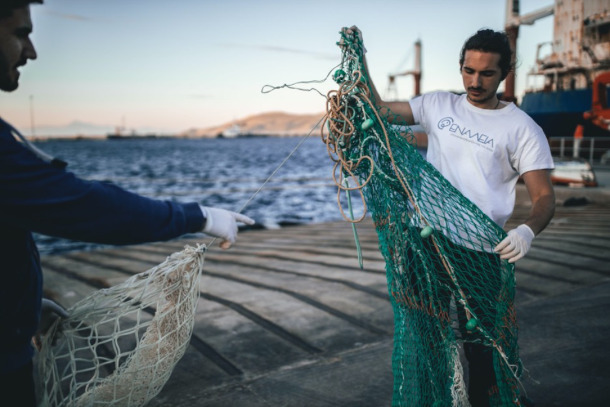
Since around 20% of the marine plastic they collect is fishing gear, Enaleia encourages fishermen to keep their nets out of the sea by upcycling them preemptively. Enaleia founder Lefteris Arapakis assists with these efforts. (Photo: Courtesy of Enaleia)
By some estimates by weight there could be more plastic than fish in the oceans in less than 30 years. Lefteris Arapakis, named the UN Young Champion of the Earth for Europe in 2020, started the non-profit Enaleia to enable Greek fishermen to become part of the solution by collecting plastic along with their fishing haul, and he joins Host Bobby Bascomb to discuss.
Transcript
BASCOMB: From PRX and the Jennifer and Ted Stanley Studios at the University of Massachusetts Boston, this is Living on Earth. I’m Bobby Bascomb.
The world’s oceans are increasingly a dumping ground for our waste. Each year roughly 10 million metric tons of plastic end up in the oceans, and that number is expected to double in the next 15 years. By some estimates there could actually be more plastic, by weight, than fish in the oceans in less than 30 years. And the damage is enormous, plastic is eaten by wildlife that starve from malnutrition, it’s acidifying ocean water and entangling whales. The scale of the challenge is staggering but activists like Lefteris Arapakis are taking action. Lefteris started the non-profit Enaleia to enable Greek fisherman to become part of the solution by collecting plastic along with their fishing haul. Lefteris was named the UN Young Champion of the Earth regional winner for Europe in 2020, and he joins me now for more. Lefteris, welcome to Living on Earth!
ARAPAKIS: Yeah, thank you so much for the invitation. It's really exciting to be here together.
BASCOMB: Well, please start by telling us about the fishing community of Piraeus, where you grew up. What did you see there that led you to take on marine plastic?
ARAPAKIS: Well, the fishing community of Piraeus is not as exotic as it sounds. Piraeus is actually the main port of Athens, and Athens is the capital of Greece. So you know, it's pretty much a very industrial region. My family is a family of fishermen. They are like five generations now fishing professionally from the sea. So as a child, my first memories were from from the sea, you know, on a boat, so it really affected who I am. But I would have never imagined that this would make me collect plastic from the sea. But when the economic crisis, you know, peaked in Greece, like in 2016, unemployment skyrocketed. So I wanted to do something about unemployment. And I was discussing back then with my father, and he was complaining to me, like typical fisherman behavior, that they couldn't find enough personnel for the fishing boats. So I'm like, okay, I will start a fishing school, and we'll start training unemployed people to become fishermen. So this is how we started Enaleia. We trained like around 150 unemployed people, created around 100 jobs in the country. So when we were designing the curriculum, on the first fishing trip, I was really shocked to see that the fishermen were collecting with their nets, not only fish, but also plastic. Like a lot of it. And I still remember in the first catch, we saw like this soda drink that had expired in 1987. So that's like in the sea for 30 years.
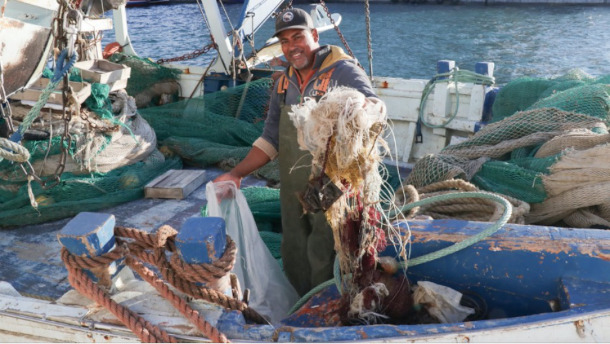
Fishermen who participate in the program receive a small monetary reward, about $10-$50 a month, depending on how much plastic they collect. (Photo: Courtesy of Enaleia)
BASCOMB: A soda bottle.
ARAPAKIS: Yeah. And then the fisherman just took it from my hand, and he threw it back in the sea. But we fished, like, the next day so many plastic bottles, plastic bags, fishing nets, even a whole refrigerator. And they just threw it back in the sea. And then I started reading all the papers. They were indicating that by 2050, we'll have more plastic than fish in the seas, if we continue like that. So we realized there is no use getting more fishermen if we don't do something about the plastic. And so we started to, decided to start a pilot in our local port here in Piraeus, in the fish market of Keratsini. And in the beginning it was just, you know, my father and one of his friends. And what was shocking was that it was not coming all from Greece. Like we collected a lot of, you know, plastic bottles from Egypt, or a lot of soda drinks from Turkey, a lot of beers from Italy, even a TV from Spain. So we realized that, you know, marine litter is kind of, it's not a national challenge, but in our case, a Mediterranean challenge. So that's why we created a project called the Mediterranean Cleanup. And with that project, we started training fishing communities to fish for plastic.
BASCOMB: So how does your project actually work? How did you convince fishermen to collect plastic and fish? And then, you know, how did you make it worth their while to do so?
ARAPAKIS: We were having a lot of meetings with alcohol, so that helped to bond with the fishermen. I'm just kidding. I would end up going to the local cafes, or supermarkets where the family of the fishermen was working. And I was explaining to them what we were doing. And then they were asking me all the time, has my husband joined the project yet? I'm like, no, no, he's still considering. And then they would say, you know, he's considering no more. So the main motivation for them was to protect the sea, but also to create a positive story telling. The fishermen were part of the problem and a big one. Around twenty percent of the plastic we collect is fishing gear. So they wanted also to become a part of the solution. And in the beginning, we started with a volunteering scheme, but then we had a small rewards system. So they get like $10 to $50 a month, regarding on how much plastic they collect. And we saw that when we started giving something back, they started to collect like seven times more plastic. If I can give you an example?
BASCOMB: Please.
ARAPAKIS: There was this fishing port in the north of Greece. So I was discussing with the president of the fishermen there, and he told me, Lefteris, I will collect plastic, but none of the rest will. I'm like, okay, do that. And let me deal with the rest. So I had this discussion with each and every one of them. Forty times on that day. And the local recycling company gave us like, you know, an urban recycling bin for the plastic. And they told me, if you manage to fill it up in a year, it will be a miracle. The next night comes, the fishermen come in the port, all of them, and they fill the port with plastic. Like over the first two hours, we fill six of these recycling bins. And then all of them, they were just looking at how much plastic they collected and they were like, oh my god, were we collecting so much plastic every day all these years and throwing it back? What have we been doing? And then after the first day, these guys became activists, actually. And then they started recruiting more and more and more fishing communities.
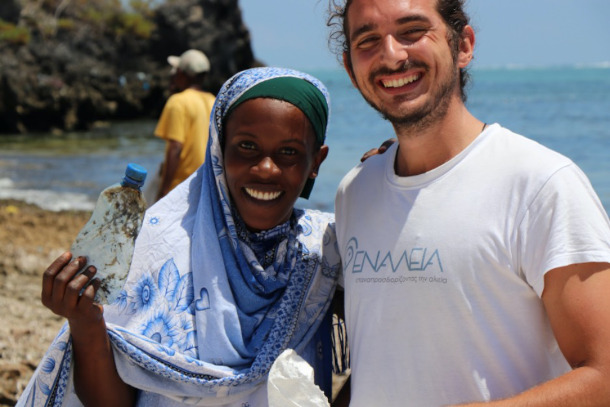
Enaleia has expanded into Kenya with the help of UNEP, where they now collect about 100,000 pounds of plastic from the Indian Ocean every month. (Photo: Courtesy of Enaleia)
BASCOMB: So how is it working out now? You know, do you have any numbers on how much plastic you've actually collected? You know, daily, weekly, monthly, and and how many fishermen are you working with?
ARAPAKIS: So currently, we are working with more than 2000 fishers in the Mediterranean and Kenya. And we are collecting around 10,000 pounds of plastic from the sea weekly. So that's the equivalent of collecting two trucks full of plastic from the sea daily. Since we started our project, we have collected over a million pounds of plastic from the oceans. And our goal is to collect more than 20 million pounds from the ocean in the next two years.
BASCOMB: Wow, that's a wonderful goal. Now, collecting plastic is one thing, but making sure it doesn't end up in a landfill is quite another. Have you tackled that side of the equation, you know? Where's all this plastic going once you've collected it and it's on land?
ARAPAKIS: So at the beginning we were collecting all this plastic, you know, vast amounts. We had no idea what to do with that because plastic from the ocean, plastic from the seas, is not like regular plastic. It has algae on it, it has mussels, it has oysters, it has dead fish. But over a lot of experimentation, we found the certified recycling companies in every port. So we have also personnel that take every night the plastic from the fishing communities. Then this plastic is washed, and then it's turned into little balls of plastic called pellets. And this material then can be melted to create new products such as tables, chairs, benches, shoes, jackets, even skateboards. So when you put a price on that, and these products help us do that, we can motivate more and more fishing communities to collect the plastic from the seas and the oceans.
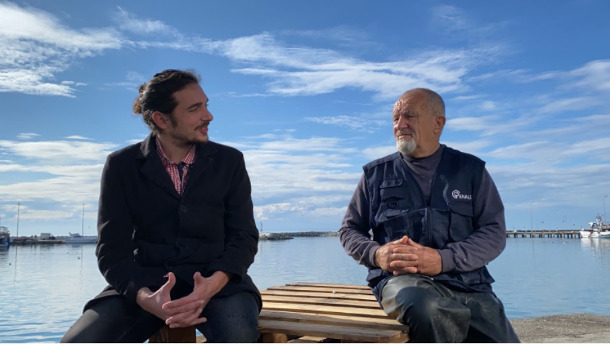
Lefteris Arapakis says that convincing fishermen to join the cleanup involved a lot of one-on-one conversations. (Photo: Courtesy of Enaleia)
BASCOMB: You know, I've heard marine plastic described as you know, you come home and your bathtub is overflowing with water. The tap is running, there's water seeping through the ceiling. What's the first thing you do? It's turn off the tap, right? Not clean up the floor. Have you thought or worked with partners to look upstream at the plastic problem right now? I mean, you're cleaning up the floor, which is very, very useful and you know, super important, but it's going to keep coming, right? So have you worked with any partners to you know, turn off the tap?
ARAPAKIS: You make an excellent point. What we're doing with the cleanup operations is just treating the symptoms of the problem. We're not fighting the cause of the problem. We need to stop plastic from entering the sea. So on that regard, the most common plastic waste we find both in Kenya, in Greece and in Italy, is fishing gear. So on that regard, we are now working over the last three years with the fishing communities to collect their used fishing gear and prevent it from entering the ocean at the first place, and then making sure that this material is going to be recycled and upcycled into new products. And the second thing we try to do is we are working with international organizations, such as the European Commission or the United Nations, and we're trying to take part in these conversations. We're a part of the UN ocean conferences, the COP. And also now the new agreement that was made, the UNEA agreement, and we try to provide some working solutions. And we try to provide some data about the plastic that's currently in the oceans, to make them create some new laws about sustainable plastic use. We don't find plastic straws in the seas in the oceans. It's like 0.000002% of the plastic. We find fishing nets. We find shipping ropes. We find plastic bags. And we need to have some legislation to ban them or invest in a circular economy of them.
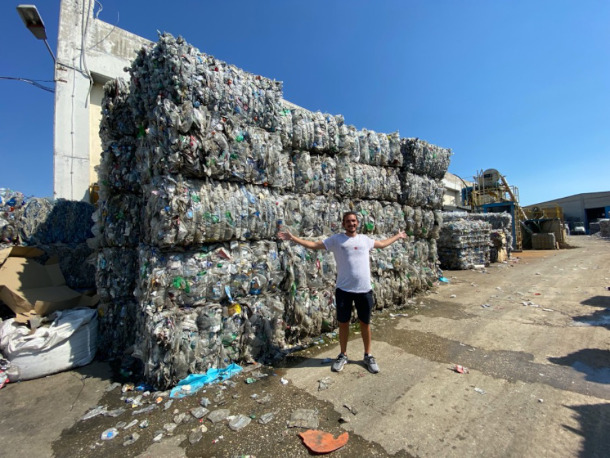
Once the plastic is collected by the fishermen, it is sent to a variety of partner organizations that upcycle the waste into new products. (Photo: Courtesy of Enaleia)
BASCOMB: So long term, what is your goal with your organization? Where do you see yourself with this project, you know, twenty, thirty years from now?
ARAPAKIS: Well, in twenty years honestly, hopefully ten, I see myself unemployed. Hopefully we will be able to create a solution for, for plastic. And to make that happen we need to scale up even more our plastic cleanup operations. We need to prevent more plastic from entering the sea with the fishing communities. It's not easy what we do. It's something you must be passionate about. And I am. And honestly, I really want to have a significant and a real impact, and yes, getting out of business, it's the best way to achieve that.
BASCOMB: Well I wish you so much luck in putting yourself out of business and cleaning up the ocean and the Mediterranean. Lefteris Arapakis is founder of Enaleia and a Young Champion of the Earth 2020 regional winner for Europe. Lefteris, thank you so much for your time today. It's been a real pleasure talking with you.
ARAPAKIS: Thank you so much for the interview and the amazing questions.
BASCOMB: By the way a recent study published in the journal Science Advances estimates that nearly half a million miles of fishing line are lost in our oceans each year. That’s enough to stretch all the way to the moon — and back.
Links
United Nations Environment Programme | “Young Champions of the Earth: Lefteris Arapakis”
Previously on Living on Earth: “Nations Vow to Curb Plastic Waste”
Living on Earth wants to hear from you!
Living on Earth
62 Calef Highway, Suite 212
Lee, NH 03861
Telephone: 617-287-4121
E-mail: comments@loe.org
Newsletter [Click here]
Donate to Living on Earth!
Living on Earth is an independent media program and relies entirely on contributions from listeners and institutions supporting public service. Please donate now to preserve an independent environmental voice.
NewsletterLiving on Earth offers a weekly delivery of the show's rundown to your mailbox. Sign up for our newsletter today!
 Sailors For The Sea: Be the change you want to sea.
Sailors For The Sea: Be the change you want to sea.
 The Grantham Foundation for the Protection of the Environment: Committed to protecting and improving the health of the global environment.
The Grantham Foundation for the Protection of the Environment: Committed to protecting and improving the health of the global environment.
 Contribute to Living on Earth and receive, as our gift to you, an archival print of one of Mark Seth Lender's extraordinary wildlife photographs. Follow the link to see Mark's current collection of photographs.
Contribute to Living on Earth and receive, as our gift to you, an archival print of one of Mark Seth Lender's extraordinary wildlife photographs. Follow the link to see Mark's current collection of photographs.
 Buy a signed copy of Mark Seth Lender's book Smeagull the Seagull & support Living on Earth
Buy a signed copy of Mark Seth Lender's book Smeagull the Seagull & support Living on Earth

